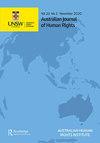Re-thinking privacy in Australia in the wake of Dobbs v Jackson Women’s Health Organization
Q1 Arts and Humanities
引用次数: 0
Abstract
ABSTRACT In June 2022, the Supreme Court of the United States overturned its decision in Roe v Wade, 410 US 113 (1973), which had established a right to abortion founded on an implied constitutional right to privacy. The decision in Dobbs v Jackson Women’s Health Organization, 597 US (2022) has sparked fervent debate about women’s reproductive rights and access to healthcare in the United States. This article presents a decisional privacy perspective on Dobbs and considers its implications for privacy rights in Australia. The concept of decisional privacy protects an individual’s ability to make decisions which contribute to defining their identity, free from the unjustifiable interference of other individuals or the state. Drawing on examples of the violation of rights of LGBTQIA+ individuals, I argue that threats to decisional privacy are alive and well in Australia; yet a failure to conceptualise and articulate them as such undermines the value of privacy both to individuals and to society. The Dobbs decision offers a prime opportunity to re-think the meaning and value of privacy in Australian law and society, not only to enrich privacy law scholarship and jurisprudence but also to enable privacy to be more robustly protected as a human right.多布斯诉杰克逊妇女健康组织案后对澳大利亚隐私权的重新思考
2022年6月,美国最高法院推翻了其在Roe v Wade案(410 US 113(1973))中的判决,该判决确立了基于隐含的宪法隐私权的堕胎权。多布斯诉杰克逊妇女健康组织案(597 US(2022))的裁决在美国引发了关于妇女生殖权利和获得医疗保健的激烈辩论。本文提出了一个关于Dobbs的决策隐私视角,并考虑了它对澳大利亚隐私权的影响。决策隐私的概念保护个人做出有助于确定其身份的决定的能力,不受其他个人或国家的无理干涉。我以侵犯LGBTQIA+个人权利的例子为例,认为对决策隐私的威胁在澳大利亚是存在的;然而,如果不能将其概念化并清晰地表达出来,就会损害隐私对个人和社会的价值。多布斯案的判决为重新思考隐私在澳大利亚法律和社会中的意义和价值提供了一个绝佳的机会,不仅丰富了隐私法学术和法理学,而且使隐私作为一项人权得到更有力的保护。
本文章由计算机程序翻译,如有差异,请以英文原文为准。
求助全文
约1分钟内获得全文
求助全文
来源期刊

Australian Journal of Human Rights
Arts and Humanities-History
CiteScore
1.30
自引率
0.00%
发文量
43
期刊介绍:
The Australian Journal of Human Rights (AJHR) is Australia’s first peer reviewed journal devoted exclusively to human rights development in Australia, the Asia-Pacific region and internationally. The journal aims to raise awareness of human rights issues in Australia and the Asia-Pacific region by providing a forum for scholarship and discussion. The AJHR examines legal aspects of human rights, along with associated philosophical, historical, economic and political considerations, across a range of issues, including aboriginal ownership of land, racial discrimination and vilification, human rights in the criminal justice system, children’s rights, homelessness, immigration, asylum and detention, corporate accountability, disability standards and free speech.
 求助内容:
求助内容: 应助结果提醒方式:
应助结果提醒方式:


